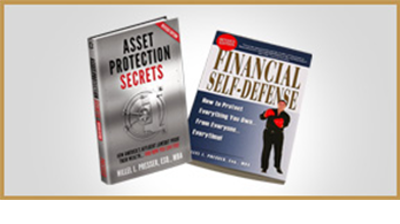

Attorney for Equity Stripping in Boca Raton
You Can Make Your Assets Toxic to a Plaintiff Suing You
You can't always entirely rely on the exemption laws or that your assets are titled to one or more protective entities. You may need an additional firewall. Strip the equity from everything you own − your real and personal property. Your goal is to convert your unencumbered assets into debt-ridden assets worthless to a plaintiff.
What Is Equity Stripping?
Equity stripping refers to strategies used to reduce the equity in a property. These strategies are intended to make a property undesirable to creditors.
Mortgages and Liens in Equity Stripping
Equity stripping can be accomplished with many different types of mortgages and liens. A lien is a mortgage or security interest filed against a debtor's real estate or personal property. As the property owner, you own the property, but you transfer the economic value of your property to the mortgage holder. This reduces the equity of your property and the equity your creditor or litigant can seize.
It's easy to understand. If your home is worth more than what you owe on the mortgages (or liens) against it, you have equity in your property for your litigant to claim. To protect your home, you would reduce (or strip) your equity by increasing the mortgages or liens against your home. This strategy is simple, but some terminology may make it less confusing.
A Mortgage vs A Deed of Trust
You are familiar with mortgages – a voluntary lien on real estate to secure a debt that you owe. Some Western states call it a deed of trust. Instead of giving the lender a mortgage, the borrower deeds the property to a third-party trustee. The borrower can occupy the property as long as the debt is paid.
The only difference between a mortgage and a deed of trust is that a trustee can sell your property at public auction if you default. A mortgage holder must go through a court foreclosure to auction your property.
Equity Stripping and Personal Property
Different terminology applies to personal property. A lien on personal property is a security agreement. You may also pledge personal property to secure your debt. The personal property may then remain in the possession of the secured party (i.e., pledged jewelry to a pawn shop).
More typically, the debtor continues to possess the collateral. The secured party only files a notice of lien (a financing statement) in a public recording office to give third parties notice that the property is encumbered.
You may place multiple liens against one property. The priority of each lien is then determined by their priority of filing in the public records.
The point is that when you have valid liens, a claimant can only seize whatever equity you have in the property. For protection, you want little or no equity exposed. Your $300,000 home with a $300,000 mortgage is worth nothing to a litigant. Your goal is to have every asset worth nothing to litigants.
Discover more through the following links:
- How to Discourage Lawsuits
- Protect the Loan Proceeds
- Covering Your Loan Payments
- Mortgage Your Business
- Self-Financing Your Business
- The Lessor's Lien
- The LLC Capitalization Tactic
- The Obligation
Yes, You Can Lose Everything!
You may think that your wealth is safe and that you don't need protection. But don't delude yourself and accept reality — For every 60 minutes you spend making money, spend 60 seconds thinking about how to protect it!


-
 Schedule an Educational Presentation
Schedule an Educational Presentation -
 Asset Protection Quiz
Asset Protection Quiz -
 Read Our Complimentary Books
Read Our Complimentary Books


